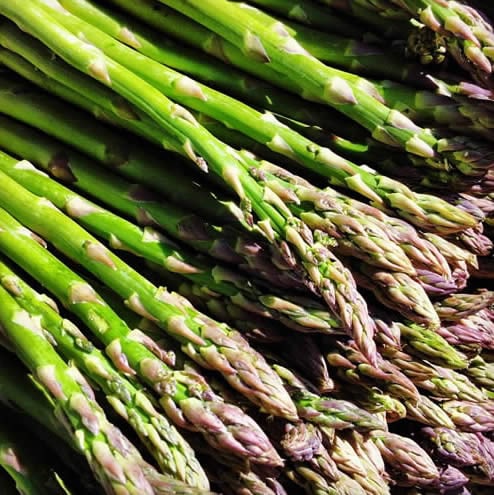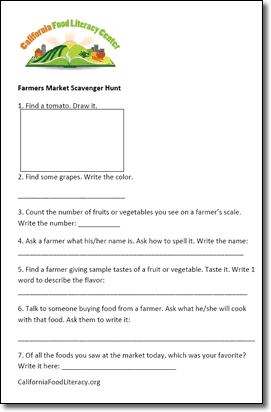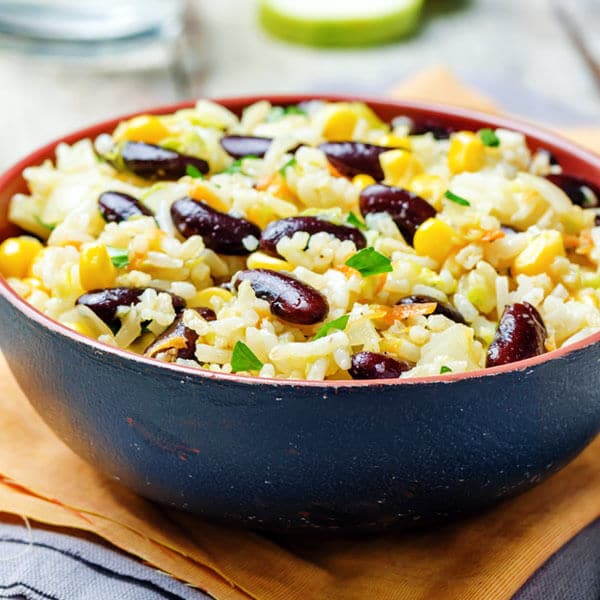Ten Tips for Shopping the Farmers Market
Last Updated September 20, 2018 · First Published October 7, 2012

Did you know that only 2% of the food that’s grown locally is purchased locally? At the Food Literacy Center, we celebrate the delicious benefits of making food choices that benefit our health, environment, and community. We call this “food literacy,” and our nonprofit’s mission is to educate and inspire others to learn about the impacts of their food choices. One easy way to increase your food IQ is to eat from the farmers markets. Shopping this way provides many community benefits.
- We have 10 times as many conversations at the farmers markets as we do at the grocery store, according to one study.
- Local food has more nutrition: a report by the Harvard Medical School Center for Health and the Global Environment found that food traveling long distances will be less nutritious than food grown and consumed locally, because food begins to lose nutrients after harvested.
- It supports local farmers. Currently, our country has only one farmer under the age of 35 for every eight farmers over the age of 65. Buying from them helps support the future of the profession.
Yet, can you make a whole meal from the farmers market? And is it affordable? The answer to both these questions is: Yes! Here are some tips:
Practical Tips to Being a Full-Blown Farmers Market Shopper
- Make a shopping list: Keep a running list every time you run out of an item. That way, you won’t have to guess when you arrive at the market about whether you have enough eggs at home.
- Visit the farmers market first: Take your shopping list straight to the farmers market. Deplete as much of your shopping list as you can. Visit the grocery store afterwards. You’ll be surprised by how many items you can purchase—and even substitute.
- Make substitutions: Do you have bananas on your grocery list? Why not buy some seasonal fruit instead?
- Get creative: We tend to get trapped in a food rut, making the same familiar meals over and over again. Why not step outside the comfort zone? Instead of making another cold cut sandwich for lunch, how about making a fried egg sandwich with eggs from your local farmer and bread from the local baker?
- Ease into it: Don’t purchase five vegetables you’ve never seen or cooked before. You’ll end up frustrated once you’re at home, and will probably throw half those veggies away. If you see something new and interesting, purchase just one. You’re more likely to use it, and you’ll feel more accomplished. Try one new veggie each week: a dikon one week, an opo the next. Little by little, you’ll start to incorporate them into your everyday recipes with ease.
- Commit to one farmers-market-only meal a week: If every American ate just one meal a week using local, organic foods, we could reduce oil consumption by over 1.1 million barrels of oil every week, according to Animal, Vegetable, Miracle by Barbara Kingsolver. As part of the “ease into it” plan, try making just one meal a week that’s completely purchased from your local farmer. You can buy corn tortillas, onions, and cheese (yes, all from the market!) for an easy quesadilla supper. Or you could buy croissants, honey, and cheese for a gourmet farmers market breakfast. After you’ve tried one meal a week, you’ll want to make it two meals, then three! But start with one, and see how truly easy—and delicious—it can be!
- Limit recipes to those that are seasonal: Peaches in January don’t stand up to the quality of a dripping, juicy peach purchased in August. If you want to succeed, you’ve got to start with the right tools: a seasonal recipe is essential. Most food blogs offer seasonal recipes.
- Shop at the end of the market and save: Go to the farmers market during the last 30 minutes. Farmers often drop their prices considerably because they don’t want their produce to spoil. You can find entire boxes of produce at greatly reduced prices—far cheaper than the grocery store.
- Remember: you’re not eliminating—you’re adding! If you’re a passionate foodie who believes any good meal should taste amazing, eating locally is for you! Think of the richness you’re adding to your life and your diet!
- Get your kids involved! Use this scavenger hunt [PDF, 263kb] to get your kids excited about the farmers market, too!





















Great tips Amber! I’m proud to say I already do many of them but I love the idea of the farmer’s market only meal – a great way to know I’ll be providing a good one for my non-meat-eating hubby!
Terrific tips, Amber! The farmers’ markets definitely encourage more chatting and conversations, which leads to learning about new fruits (like jujubes for me!) and veggies. I love your scavenger hunt form, too.
Love shopping at farmers’ markets! If I am interested in a new fruit or veg, I ask the farmer how they use it. I learn so much from them!
Love this post, Amber!
Great point from Karen about asking vendors for recipes and suggestions for using the produce. I also shop regularly at the same stalls and occasionally get a few “bonus” items tossed in – “Oh, take a pluot too, they’re so good this week!”
The vendors at my local farmers market are happy to share their recipes regarding a “new” veggie. Very helpful. Love them.
I spent many years at farmer’s markets when i lived in small town America…I need to find one here in the larger city and talk my bf into using it. Thank you for the scavenger hunt, it will come in handy.
Love shopping the markets, and besides the great big one just south of the city, we’ve had nearly a dozen smaller weekly markets popping up to serve the inner city better! One word of caution, though: just because it’s at the Farmer’s Market, doesn’t mean it’s organic or even that it’s not processed. I carelessly bought perogies at the market once, only to find out at home that they were made with DEHYDRATED potatoes, and even a preservative! Check your market’s rules for vendors: here, if it’s MADE in the province, it’s considered local and that’s good enough. I had a vendor just yesterday tell me that their farm is “As organic as we can be”, right after saying that she didn’t know whether her potatoes were GMO or not, and that they certainly did spray them with pesticides. Probably still better than supermarket produce, but let’s just say it’s… Read more »
Very true, some even buy there items whole sale and resell them. You do need to be careful.
I agree, get to know the farmers! At my local market I have found a husband & wife team who have a small farm about 5 miles from me, if I run out midweek (which I do) she is happy to have me come out. She picks what I want in front of me. They are also bee keepers and raise chickens. For me, this is one stop shopping!
Andrew, thanks for another great month of food literacy education through October Unprocessed! I know you’ll inspire folks to eat their veggies! 🙂
Another suggestion is to get to know the farmers at the market. Ask them about themselves and their farms. It will be much more interesting than asking the shop assistant at the supermarket where to find the frozen peas. You’ll develop favourite farm stalls and they’ll save the things you like if you’re late one time. They’ll probably be able to tell you what’s coming along in the field and what they’ll have next time so you can plan. You’ll also get to know the other shoppers because you’ll all be there at the same time each week. It becomes an enjoyable social event, not just the drudgery of shopping.